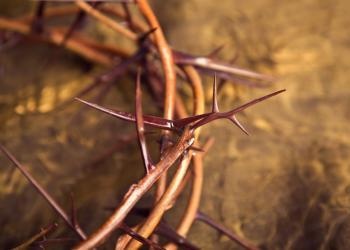Saved By His Life

Have you noticed this in your Bible before? The New Testament records details about a very important festival that the early Church of God observed during the spring of each year. It wasn't Easter or any of the other unbiblical, modern festivals that churches observe today. It was called the Feast of Unleavened Bread.
You can read about it in 1 Corinthians chapter 5, verses 7 and 8. The book of Acts also gives record of these days being observed by God's people (Acts 12:3; 20:6).
("Leaven" is what makes bread rise before baking it. In Bible times, the leaven was yeast. Today, the popular leavening agents are yeast, baking powder and baking soda. Therefore, unleavened bread is flat bread, like a cracker.)
Have you heard of this spring festival before? Do you know why Christ kept it and why the New Testament Church observed it? It's actually a very inspiring time of year for God's people as we are reminded that while "we were reconciled to God through the death of His Son, much more, having been reconciled, we shall be saved by His life" (Romans 5:10, emphasis mine).
The Days of Unleavened Bread picture putting sin out of one's life—just as those early brethren put leavening out of their homes (1 Corinthians 5:7). They also made a point of eating unleavened bread each day of the festival week. That pictured the fact that they were trying to put spiritual "unleavened bread" into their lives throughout the year—the unleavened bread of a sinless life that Jesus represented. Paul described it as "the unleavened bread of sincerity and truth" (1 Corinthians 5:8).
I always find it interesting that the apostle Paul wrote his first letter to the Corinthians during the Days of Unleavened Bread—discussing leavening as representing sin in chapter 5. But then, as he finishes off the letter, Paul speaks of Jesus' and our resurrections in the well-known resurrection chapter, chapter 15.
It was during the Days of Unleavened Bread, in the context of encouraging Christians to properly observe this Feast, that Paul drew a direct link between Jesus' resurrection and leaving sin stating: "And if Christ is not risen, your faith is futile; you are still in your sins!" (15:17). And so we see a deep meaning fulfilled in these days when our Church forefathers ate unleavened bread—instead of the risen, leavened bread they normally ate during the rest of the year. It's all because of the symbolism of putting sin out of our lives and putting the righteousness of Christ into our lives.
Jesus was raised from the dead during the week of the Unleavened Bread festival. Coming out of sin has an element that requires Jesus' resurrection. First Corinthians chapter 15 contains some of the most important understanding about Christ's resurrection in the entire New Testament.
Our sins are forgiven and we are reconciled to God through the death of His Son. But beyond that, we are thankful that our faith is not in vain—that Christ is risen that we may be saved by His life, by "Christ in you, the hope of glory" (Romans 5:10; Colossians 1:27).
Because of Jesus' instructions to His disciples, and because of this subsequent example of the New Testament Church, I too observe a week of eating unleavened bread—because of the immense symbolism surrounding these days. They picture putting sin out of my life, putting the righteousness of Christ into my life, and I'm thankful that I may be saved by the resurrected life of Jesus Christ.
You can read more about this important, New Testament biblical festival in our booklet: "Holiday or Holy Days: Does it Matter Which Days We Observe?" and "God's Holy Day Plan: The Promise of Hope for All Mankind." Read them online now or order your free copy. You'll be glad you did.
